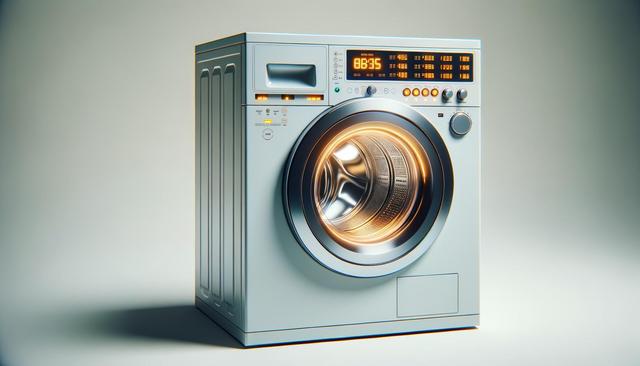Why Energy Efficiency Matters in Washing Machines
As households continue to seek ways to lower energy consumption, washing machines have become a key focus. An energy-efficient washing machine uses less electricity and water per cycle, making it an environmentally responsible choice. These machines are designed with advanced motor technology, optimized wash cycles, and water-saving features that contribute to long-term savings. In addition to reducing carbon footprints, energy-efficient models can also lessen wear and tear on clothing thanks to gentler wash cycles.
When evaluating efficiency, pay attention to the Energy Rating Label. This label provides an overview of how much power the machine uses annually, allowing consumers to compare models objectively. Machines with inverter motors, for example, adjust their speed depending on the load, consuming only as much energy as needed. This adaptive feature not only boosts performance but also prolongs the machine’s lifespan.
Another aspect to consider is water usage. High-efficiency washers typically use a fraction of the water that traditional top-load machines consume. This is particularly important in areas where water conservation is a priority. Reduced water use doesn’t mean sacrificing performance—modern machines maintain powerful cleaning capabilities through intelligent drum designs and high-speed spin cycles.
Key Features to Look for in an Energy-Efficient Model
Before purchasing a new washing machine, understanding which features contribute to energy efficiency can help you make a well-informed decision. While price and capacity are often top of mind, efficiency-related features should also take priority. Here are a few key components to consider:
- Load sensing technology: Automatically adjusts water level and cycle time based on the load size.
- Eco wash cycles: Use lower temperatures and slower spin speeds to conserve energy.
- Cold wash settings: Capable of cleaning clothes effectively without hot water.
- High spin speeds: Extract more water from clothes, reducing drying time and energy consumption.
Smart features are also becoming more common. Many efficient machines now offer Wi-Fi connectivity and mobile app integration. These allow users to monitor energy usage, start or pause cycles remotely, and receive maintenance reminders. While not essential, these features can contribute to improved efficiency and user convenience.
Front-Load vs. Top-Load: Which is More Efficient?
The debate between front-load and top-load washing machines often centers on efficiency. Generally, front-load washers are more energy- and water-efficient due to their horizontal drum design. This design requires less water to saturate clothes and uses gravity to tumble fabrics, minimizing the need for excessive agitation. As a result, front-loaders often come out ahead in terms of both performance and efficiency metrics.
Top-load machines have evolved over the years, and newer high-efficiency models without agitators can also offer impressive savings. These models use impellers instead, which reduce water usage and are gentler on fabrics. However, they may still lag behind front-loaders in overall efficiency. Key differences include:
- Front-load machines typically use 40-50% less water than standard top-loaders.
- They often have faster spin speeds, leading to shorter drying times.
- Top-loaders may be easier to load and unload, especially for users with mobility challenges.
Ultimately, the right choice depends on your household needs, space availability, and personal preferences. Both types can be energy-efficient when equipped with modern technologies.
Maintenance Tips to Maximize Efficiency
Even the most energy-efficient washing machine can lose its performance edge if not properly maintained. Regular care ensures that the machine continues to operate at its intended efficiency level. Simple actions can help extend the life of your appliance and keep utility costs low.
Here are some practical maintenance tips:
- Clean the detergent drawer and filters regularly: Residue buildup can affect water flow and wash quality.
- Run a monthly cleaning cycle: Use a manufacturer-recommended cleaner or a mixture of vinegar and baking soda to remove grime and odors.
- Leave the door open after use: This helps prevent mold and mildew from forming inside the drum.
- Check hoses and connections: Look for leaks or blockages that could affect water intake or drainage.
Additionally, avoid overloading the machine, as this can strain the motor and reduce cleaning effectiveness. Using the right detergent, especially one formulated for high-efficiency machines, also plays a role in maintaining optimal performance. These small habits can lead to significant savings and help you get the most out of your investment.
Balancing Cost and Efficiency
While highly efficient washing machines may carry a higher upfront cost, the long-term savings can make them a cost-effective choice. Energy and water savings over the machine’s lifespan can offset the initial investment. That said, there are many models across various price ranges that offer a strong mix of features and efficiency.
Look for models with certifications or ratings from recognized energy efficiency programs. These designations indicate that the appliance meets or exceeds specific standards for energy conservation. Additionally, consider the warranty and service options offered by the manufacturer, as these can add value and long-term peace of mind.
When shopping, it can be helpful to create a checklist of priorities, such as:
- Energy and water usage ratings
- Capacity suitable for your household size
- Availability of eco-friendly cycle options
- Noise levels during operation
- Smart connectivity and additional convenience features
By balancing your needs with available features, it’s possible to find a well-regarded, energy-efficient machine that aligns with your budget and sustainability goals.
Conclusion: Making a Smart, Sustainable Choice
Investing in an energy-efficient washing machine is a smart decision for both your home and the environment. With thoughtful research and a clear understanding of what features matter most, you can find a machine that not only meets your laundry needs but also supports long-term sustainability. Whether you’re upgrading your current appliance or outfitting a new home, focusing on energy and water savings can lead to meaningful benefits over time. Keep efficiency, functionality, and maintenance in mind, and you’ll be well-equipped to make an informed, responsible purchase.







